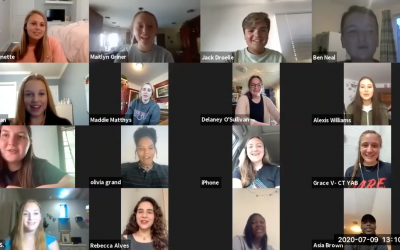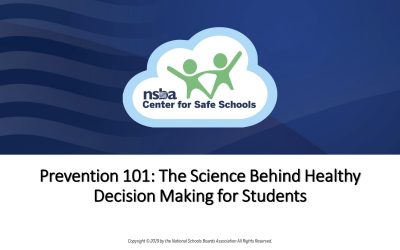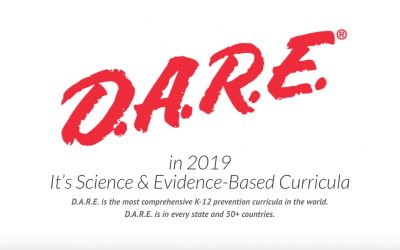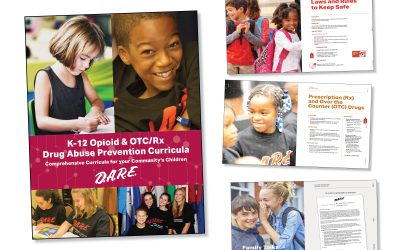
Vaping Enhancement Lesson
Vaping nicotine nearly doubled among high school seniors from 11 percent in 2017 to 20.9 percent in 2018. More than 1 in 10 eighth graders (10.9 percent) say they vaped nicotine in the past year, and use is up significantly in virtually all vaping measures among eighth, 10th and 12th graders1. These are—by far—the biggest one-year increases ever seen for any substance in the history of the MTF survey2.
In response to this crisis, D.A.R.E. has developed and launched a Vaping Prevention enhancement lesson for both Middle School and High School students. In these lessons, students will learn about the risks associated with vaping and understand how knowledge of risk factors increases over the lifespan of a product. The lesson is FREE to D.A.R.E. communities.
The Vaping enhancement lesson is a 45 minute lesson designed for deliver by D.A.R.E. Officers. This lesson has two versions that present the information at two developmentally appropriate levels of complexity: one is designed for Middle School students in 7th or 8th grade, and one for High School students in 9th or 10th grade. In these lessons, students will learn about the risks associated with vaping and understand how knowledge of risk factors increases over the lifespan of a product.
Lesson Objectives
-
- Recognize and identify basic information about vaping.
- Understand that most people in their grade do not vape.
- Identify similarities between tobacco and vape use, attitudes, and effects.
- Identify risks associated with nicotine use.
- Understand that products initially appearing safe may later be considered harmful as research and user data are studied over time.
Thank you, D.A.R.E. Officers!
Surgeon General Sounds Alarm On Risk Of Marijuana Addiction And Harm
At a time when more than 30 states and the District of Columbia have legalized the use of marijuana for either medical or recreational use, the U.S. surgeon general says no amount of the drug is safe for teens, young adults and pregnant women.
“While the perceived harm of marijuana is decreasing, the scary truth is that the actual potential for harm is increasing,” Surgeon General Jerome Adams said…
Prevention 101: The Science Behind Healthy Decision Making for Students
The D.A.R.E. America – National School Board Association webinar conducted by Richard Clayton, PhD and David L. Wyrick, PhD on August 13, 2019 is now online to view. The webinar will help the listener understand the evidence and theoretical base underlying Prevention Science, identifying the D.A.R.E. curricula as a model program. The D.A.R.E. curricula focuses on providing cutting edge instruction that helps prevent drug use by developing basic, core Socio-Emotional skills needed for safe and responsible choices…
D.A.R.E. Launches New High School Curriculum
myPlaybook: Core is a four-lesson curriculum designed for delivery to High School Students, ideally in 9th or 10th grade. The lesson content is aligned with D.A.R.E. Elementary and Middle school program concepts, continuing the focus on understanding risk behavior…
D.A.R.E. Partners with American Foundation for Suicide Prevention to Launch “More than Sad”…Teen Mental Health Enhancement Lesson
More Than Sad is a 45 minute enhancement lesson designed for delivery by D.A.R.E. Officers to High School students, ideally in 9th or 10th grade. D.A.R.E. collaborated with the American Foundation for Suicide Prevention (AFSP) to adapt this lesson for delivery by…
3 Big Prevention Ideas to Keep Young People Safe and Healthy
Navigating teen life while confronted with current issues like vaping, teen suicide, social media bullying, and illicit drugs, including today’s opioid epidemic, mean young people today must make critical choices at an early age. The hopeful news is communities that...
D.A.R.E. Implementing Opioid Education in Schools
D.A.R.E is implementing opioid education programs in schools to combat opioid addiction at a younger age. The enhancement lessons are being taught at each grade level…
D.A.R.E. in 2019 – It’s Science & Evidence-Based Curricula
Read an article about D.A.R.E. by Richard Clayton, Ph.D., former Chair of Health Education and Health Promotion in the College of Public Health at the University of Kentucky. For more than 20 years, he was the director of the federally funded Center for Prevention Research
National Sheriffs’ Association Article: D.A.R.E. Responds to America’s Opioid Crisis with New K-12 Prevention Lessons
Substance abuse prevention education organization D.A.R.E. America has launched new nationwide curricula for law enforcement officer-led D.A.R.E. programs targeting K-12 classrooms, parents, and communities that will challenge the national opioid and prescription…
Copyright © 2022 D.A.R.E. America. All Rights Reserved.
Copyright © 2022 D.A.R.E. America.
All Rights Reserved.












